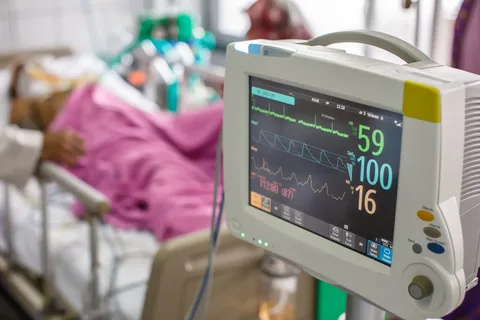Mechanical ventilation is a crucial component of a healthy and comfortable indoor environment. Mechanical ventilation can improve air quality, reduce humidity, and enhance overall comfort by ensuring proper air circulation and ventilation. In this blog post, we will explore the fundamentals of mechanical ventilation, the different types of systems available, key components, and health benefits, considerations for selecting a home- ventilator, installation process, cost factors, maintenance tips, and energy efficiency with an HVAC- system.
Understanding the Fundamentals of Mechanical Ventilation
Mechanical ventilation plays a pivotal role in maintaining optimal indoor air quality by facilitating the exchange of indoor and outdoor air. This system employs various components, including fans, ductwork, and filters, to manage airflow and eliminate pollutants from the interior environment.
This continuous circulation and filtration process is vital for preventing the accumulation of harmful contaminants and controlling humidity levels within indoor spaces. Through the strategic deployment of mechanical airing, individuals can experience enhanced air quality, significantly contributing to the overall well-being and comfort of occupants.
 Types of Mechanical ventilation system Explained
Types of Mechanical ventilation system Explained
In Mechanical ventilation system, various systems are at one’s disposal, each tailored to meet distinct air quality and environmental control needs. Exhaust-only ventilation systems primarily remove stale air from indoor spaces, typically through fans in bathrooms and kitchens. This method relies on natural air infiltration through leaks in the building envelope to replace the exhausted air.
Balanced ventilation systems represent a more sophisticated approach, simultaneously removing indoor air pollutants while introducing fresh outdoor air in equal measures. This equilibrium ensures that neither negative nor positive pressure disrupts the building’s environment, preventing unwanted drafts or moisture issues.
Energy recovery ventilation (ERV) systems elevate the concept of balanced ventilation by recovering heat or coolness from the exhausted air and transferring it to the incoming fresh air. This process significantly enhances energy efficiency, especially in climates with extreme temperatures, by reducing the load on heating and cooling systems.
Key Components of a Mechanical airing System
Several pivotal components are at the heart of a mechanical airing system, each playing a unique role in ensuring efficient and effective air circulation within indoor spaces. Fans are integral, propelling air through the system and facilitating both the extraction of stale indoor air and the introduction of fresh outdoor air.
Filters are guardians of air quality, capturing pollutants, allergens, and particulate matter, thereby purifying the air that circulates within. Controls, encompassing thermostats and other regulatory devices, provide the means to adjust airflow and system performance, allowing for fine-tuning to meet specific environmental conditions.
Together, these components form the backbone of a mechanical airing system, orchestrating a harmonious balance between air quality, humidity levels, and occupant comfort. Their concerted operation achieves a healthier and more enjoyable indoor climate, highlighting the system’s critical role in modern living environments.
The Health Benefits of Installing Mechanical airing
Incorporating mechanical airing systems into living spaces markedly improves the health and well-being of occupants through various mechanisms.
Reduction in Indoor Pollutants
By continuously cycling air, mechanical airing systems significantly decrease the concentration of indoor pollutants such as volatile organic compounds (vows), particulate matter, and other airborne chemicals, leading to a cleaner breathing environment.
Enhanced Respiratory Health
Removing allergens, dust, and pet dander from indoor air through effective filtration minimises the risk of respiratory conditions, allergies, and asthma attacks, thereby safeguarding the respiratory health of inhabitants.
Controlled Humidity Levels
By managing indoor humidity, mechanical airing prevents the growth of mound and mildew, organisms that can cause serious health issues. This control of moisture contributes to a healthier indoor climate.
Reduced Odours
Bad odours from cooking, pets, and other sources are efficiently expelled, ensuring the indoor environment remains fresh and pleasant.
Improved Sleep Quality
A well-ventilated room provides a comfortable sleeping environment, free from excess humidity and pollutants, which can significantly improve sleep quality and, by extension, overall health.
Considerations for Selecting the Home Ventilator
When embarking on the journey to select a home ventilator, several pivotal considerations come to the fore, each playing a crucial role in ensuring the selection aligns with the environmental requirements and the inhabitants’ well-being. First and foremost, the size of the space necessitates careful evaluation to determine the system’s capacity to circulate and purify the air within the premises efficiently.
Understanding the existing air quality challenges within the home also guides the selection process. Homes in areas prone to higher pollution levels might necessitate systems with advanced filtration features to combat the ingress of outdoor pollutants effectively.
Lastly, energy efficiency remains a paramount consideration. Prospective buyers should seek systems that meet their immediate air quality needs and align with energy conservation goals, ensuring long-term sustainability and cost-effectiveness.
Installation Process and What to Expect
Installing a mechanical airing system requires a systematic approach, beginning with a detailed assessment of the property’s specific needs. The process commences with an evaluation conducted by a qualified HVAC technician, who will determine the most suitable system type based on the size of the property, existing air quality, and the space’s unique requirements.
Following this initial assessment, the chosen system, whether an exhaust-only, supply-only, balanced, or energy-recovery ventilation system, will be tailored to fit the property’s specifications. Installation involves meticulously setting up ductwork, fans, and filters, ensuring that each component is optimally placed for efficient air circulation and pollutant removal.
The technician will also integrate controls that allow for easy airflow and system operation management. Upon completion, a comprehensive testing phase is undertaken to confirm that the system functions as intended, effectively enhancing indoor air quality and comfort.
Cost effective option: For Home ventilator cost
The financial landscape of acquiring a Home ventilator cost involves meticulously considering various cost factors. The initial purchase price of a mechanical airing system varies significantly based on the type of system selected, with options ranging from basic exhaust-only setups to more advanced energy-recovery ventilators.
The complexity and efficiency of the system play a pivotal role in determining the overall cost. Installation charges also contribute substantially to the expense, influenced by the property’s infrastructure’s complexity and the extent of ductwork required. Installation costs can escalate in areas where specialised labour is at a premium.
Additionally, the operational costs associated with running the system, which include energy consumption and the frequency of maintenance and replacement of components such as filters, must be factored into the budget.
Maintenance Tips for Long-Lasting Performance
Maintaining the efficiency and longevity of a mechanical airing system requires adherence to a regular maintenance regime. This encompasses replacing filters, which ensures clean air circulation by trapping pollutants and allergens.
Additionally, cleaning ductwork is imperative to prevent the accumulation of dust and debris that can impede airflow and reduce system efficiency. Inspections of fans and motors are also vital to identify any potential issues, such as wear or damage that could compromise the system’s performance early on.
Undertaking these maintenance activities can significantly extend a mechanical airing system’s service life whilst sustaining its ability to provide a healthy and comfortable indoor environment. Regular upkeep enhances system efficiency and contributes to the overall indoor air quality, underscoring the importance of consistent maintenance practices.
Efficient Operation and Energy Savings with HVAC System
Achieving efficient operation and energy savings with an HVAC system necessitates a strategic approach focused on optimising system performance whilst minimising energy consumption. Proper sizing of the HVAC- system is fundamental, as oversized or undersized systems can lead to increased energy use and reduced comfort levels. Regular maintenance, including checking and cleaning filters, coils, and fans, ensures the system runs efficiently, preventing unnecessary energy loss.
Utilising smart thermostats enables more precise control over heating and cooling, allowing for adjustments based on occupancy and time of day, which can significantly reduce energy consumption.
Additionally, incorporating energy-efficient components, such as high-efficiency motors and variable-speed drives, lowers operating costs. Embracing these practices supports the pursuit of sustainability. It enhances the system’s ability to maintain a comfortable and healthful indoor environment, demonstrating the intertwined relationship between energy efficiency and optimal HVAC- system operation.
Maximising Energy Efficiency with Your HVAC -System
Maximising energy efficiency within an HVAC- system requires a strategic approach to ensure environmental and financial benefits. Upgrading to a programmable thermostat provides the ability to adjust heating and cooling settings automatically, according to occupancy and time of day, significantly reducing energy consumption.
Sealing ductwork is essential in preventing air leaks, which can lead to unnecessary energy loss and increased utility bills. Additionally, insulating the property effectively retains heat during colder months and keeps interiors cool in the summer, reducing the demand for heating and cooling systems.
Regular maintenance schedules are paramount for ensuring that all components of the HVAC -system operate at peak efficiency, thereby avoiding energy wastage. By embracing these energy-saving measures, individuals can reduce energy expenses, decrease environmental impact, and enhance the comfort of indoor environments.
FAQs
1. How Often Should Filters in a Mechanical airing System Be Replaced?
Filters should typically be replaced every three to six months. However, the exact frequency depends on the specific system, the level of pollution in the surrounding area, and the system’s usage rate.
2. Can a Mechanical airing System Reduce Energy Bills?
Yes, particularly systems with energy recovery capabilities, such as ergs, can significantly reduce the load on heating and cooling systems, thereby lowering energy consumption and, in turn, reducing energy bills.
3. Can A Mechanical Ventilation System Be Installed In An Older Property?
Absolutely. While the installation of Mechanical ventilation system might require more extensive work, including adding ductwork, it is feasible and can greatly improve the air quality and comfort of older buildings.
4. How Does a Mechanical airing System Improve Indoor Air Quality?
By constantly circulating fresh air into the space and expelling stale, polluted air, mechanical airing systems reduce the concentration of indoor pollutants, control humidity, and prevent mould growth.
5. What Is the Difference between HVAC and Mechanical airing Systems?
While an HVAC- system focuses on heating, ventilation, and air conditioning to control the temperature and overall climate within a space, a mechanical airing system specifically targets the circulation and quality of indoor air.
Conclusion
In summary, mechanical airing is a cornerstone in fostering a healthy and comfortable indoor atmosphere. Individuals can significantly improve air quality, control humidity, and reduce indoor pollutants by judiciously selecting, installing, and maintaining a suitable system. The benefits extend beyond physical well-being, encompassing energy efficiency and financial savings, particularly when integrated with an HVAC- system. This exploration underscores the importance of understanding the various types of mechanical airing available and their impact on enhancing indoor living spaces.
| Other Good Articles to Read |
| niche blogs connect |
| blogs 97 |
| Blog Stitution |
| blogs unplugged |
| blogs cotch rouge |
| blog signatr |
| blog sintonias |
| blog zilla |
| consumer forums |
| finance forums |
| g blogs |
| too blog |
| Related Business Listings |
| Contact Directory |
| Local Business Profiles |



